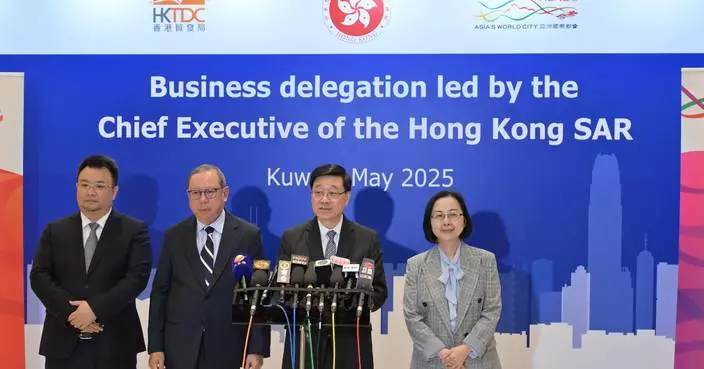DH urges public to receive initial and booster doses of COVID-19 vaccine at appropriate time as COVID-19 activity reaches six-month high in Hong Kong
The Centre for Health Protection (CHP) of the Department of Health today (April 25) announced that the local COVID-19 activity in Hong Kong has continued to increase in recent weeks, and it is expected to increase further in the coming few weeks. All sectors of the community should heighten their vigilance and enhance personal hygiene and protection measures, including receiving the initial dose of the COVID-19 vaccine as soon as possible, while those in high-risk priority groups should receive a booster dose in a timely manner to minimise the risk of serious complications and death after infection.
"The overall activity of COVID-19 in the local community has continued to rise since mid-March of this year. According to the latest surveillance data as of the week ending April 19, the viral load of the SARS-CoV-2 virus from sewage surveillance, the test positivity rate and the average consultation rate of COVID-19 cases in general out-patient clinics have continued to rise over the past four weeks. In particular, the percentage of respiratory samples testing positive for the SARS-CoV-2 virus increased to 8.21 per cent from 1.71 per cent four weeks ago (the week of March 16 to 22), a record high in the past six months. The viral load per capita of the SARS-CoV-2 virus was around 440 000 copy/litre, significantly increased from 260 000 copy/litre four weeks ago. Furthermore, sewage surveillance data showed that the local prevalence of XDV was on the rise. As XDV is a JN.1-related variant, the COVID-19 vaccines currently used in Hong Kong are still effective in preventing it," the Controller of the CHP, Dr Edwin Tsui, said.
"In the past four weeks (March 23 to April 19), the CHP recorded a total of 40 severe cases related to COVID-19 (including 10 fatal cases), with the majority of the patients being elderly persons aged 65 or above. More than 90 per cent of them had not received a COVID-19 vaccine in the past six months. Scientific data shows that timely booster doses of the COVID-19 vaccine for high-risk persons help lower the risk of severe illness and death," he added.
"Members of the public who have not received the initial dose of the COVID-19 vaccine (including infants and children) should get vaccinated as soon as possible. Those at high risk (particularly the elderly and persons with underlying comorbidities) should receive a booster dose as soon as possible for effective prevention against COVID-19 to minimise the risk of serious complications and death after infection," Dr Tsui said.
In view of the latest situation of COVID-19, the Hospital Authority (HA) has made necessary preparations to cope with the possible surge in service demand. The HA has been monitoring the daily service statistics of public hospitals (including the number of first attendances at the Accident and Emergency Departments (AEDs), the number of in-patient admissions to medical wards via AEDs and the in-patient bed occupancy rates) as well as the laboratory positivity rates of SARS-CoV-2 and influenza viruses, and will flexibly deploy hospital beds, resources and manpower in a timely manner. In light of the Easter long holiday and the upcoming Labour Day and Buddha's Birthday holidays, as well as the recent increase in the activity of COVID-19 in the local community, the HA has activated service demand surge special measures since April 14, 2025, to cope with the potential increase in service demand, including increasing manpower in AEDs and medical departments during specific peak days and periods to shorten patients' waiting times for consultations and in-patient admissions at AEDs, strengthening the gatekeeping role of Emergency Medicine wards, and co-ordinating logistics and workflow for hospital discharges through the Hospital Command Centre to expedite the workflow of discharge or transfer of patients to convalescent hospitals.
Apart from vaccination, to prevent the spread of COVID-19 in the community, the public should maintain strict personal and environmental hygiene at all times and note the following:
Patients can wear surgical masks to prevent the transmission of respiratory viruses. Therefore, it is essential for persons who are symptomatic (even if having mild symptoms) to wear a surgical mask;
High-risk persons (e.g. persons with underlying medical conditions or persons who are immunocompromised) should wear surgical masks when visiting public places. The general public should also wear a surgical mask when taking public transport or staying in crowded places. It is important to wear a mask properly, including performing hand hygiene before wearing and after removing a mask;
Avoid touching one's eyes, mouth and nose;
Practise hand hygiene frequently, wash hands with liquid soap and water properly whenever possibly contaminated;
When hands are not visibly soiled, clean them with 70 to 80 per cent alcohol-based handrub;
Cover the mouth and nose with tissue paper when sneezing or coughing. Dispose of soiled tissue paper properly into a lidded rubbish bin, and wash hands thoroughly afterwards;
Maintain good indoor ventilation;
Avoid sharing personal items;
When having respiratory symptoms, wear a surgical mask, consider to refrain from going to work or school, avoid going to crowded places and seek medical advice promptly; and
Maintain a balanced diet, perform physical activity regularly, take adequate rest, do not smoke and avoid overstress.
The CHP will continue to monitor the local situation of COVID-19 through means such as sewage surveillance, the number of severe/death cases, and relevant laboratory testing figures on human infections. For the latest surveillance data, members of the public can refer to the CHP's weekly COVID-19 & Flu Express. For more information on vaccination, please refer to the COVID-19 Vaccination Programmewebpage.
DH responds to media enquiries on air-conditioning interruption in private hospital
In response to media enquiries regarding the air-conditioning interruption that occurred at St. Teresa's Hospital in July 2024 for about an hour, the Department of Health (DH) today (May 14) gave the following response:
Regulatory regime
--------------------
The DH regulates licensed private hospitals in accordance with the Private Healthcare Facilities Ordinance (Cap. 633) (the Ordinance). The Code of Practice for Private Hospitals (the CoP) issued by the Director of Health in accordance with the Ordinance sets forth licensing and operating standards for private hospitals, including the relevant requirements for hospital facilities and equipment.
The CoP stipulates that hospital installations and equipment must be kept in good operational order and requires hospitals to have contingency plans for emergencies (such as fire and the cessation of water or electricity supply). It also sets out that healthcare engineering systems (including electrical installations, specialised ventilation systems and medical gas supplies) must be properly maintained to meet the service need and ensure patient safety. Reportable events for private hospitals are also set out in the CoP.
The DH regularly reviews and updates regulatory standards for private healthcare facilities, together with the experts of the Advisory Committee for Regulatory Standards for Private Healthcare Facilities in accordance with the established mechanism of the Advisory Committee. The DH will also continue to review the CoP in accordance with the mechanism in order to protect the interest of the public.
Investigation work
---------------------
Regarding the incident at St. Teresa's Hospital, the DH was notified by a doctor on September 2, 2024, about an air-conditioning interruption in the operating theatres on the second floor of the hospital concerned in the evening of July 31, 2024, which lasted approximately one hour.
Although air-conditioning interruption is not a reportable event of private hospitals, the DH considered that the incident might have potential patient safety concerns and therefore promptly initiated an investigation on the same day (September 2, 2024) the notification was received. The DH sent staff to conduct an inspection at the hospital concerned, checked relevant documents, evaluated the effectiveness of its contingency measures, assessed the environmental condition of the operating theatres during the interruption and followed up on the remedial actions.
According to the investigation, the incident involved a malfunction of the air-conditioning system used to regulate the room temperature which lasted for about one hour. During which, 10 surgeries were performed in various operating theatres. The hospital explained that dehumidifiers were immediately deployed in the operating theatres where higher risk surgeries were being performed, including the one where the doctor was performing an operation. According to the hospital and the nurses on site, the severity of condensation in the operating theatre did not result in water dripping onto the surgical site of patients. The ventilation system used for infection control in the operating theatres (including air filtration equipment, hourly air change rate and a positive pressure environment) was operating normally. Apart from immediately responding to the incident, the hospital has also worked with its contractor to identify the cause of the incident and take measures to prevent recurrence of similar incidents.
In addition, the hospital conducted prompt follow-up by conducting air sampling of the operating theatres and surveillance on conditions of patients who underwent surgeries during the affected period for infection, with no abnormality detected. Based on the available evidence gathered, the DH considered that there was insufficient evidence to show that the hospital has breached the requirements of the Ordinance or the CoP.
Complaint handling
---------------------
The Ordinance also provides for a complaints handling mechanism against private healthcare facilities, which includes the establishment of the statutory Committee on Complaints Against Private Healthcare Facilities (Complaints Committee), with the DH serving as the Secretariat, to handle complaints lodged by patients against licensed private healthcare facilities (including private hospitals).
There were media enquiries on whether the DH had received any complaints from patients. According to the DH's existing records, the DH received a call on September 12, 2024, from a member of the public who enquired about the complaint procedure against private healthcare facilities, and mentioned the air-conditioning system of St. Teresa's Hospital was not functioning properly when underwent surgeries. The Secretariat explained to the enquirer the function of the Complaints Committee and statutory procedures of lodging a complaint promptly. The Secretariat on the following day (September 13, 2024) sent information on the complaint procedures with complaint form and statutory declaration form to the email address provided by the person as requested. The enquirer confirmed receipt of the concerned information and forms by email but since then, the Complaints Committee has not received any complaint from the concerned enquirer in relation to this incident.
The DH has completed investigation based on all available information, but will continue to closely monitor licensed private healthcare facilities. If there is new and concrete evidence, the DH will take appropriate actions as necessary to safeguard patient safety.
















































